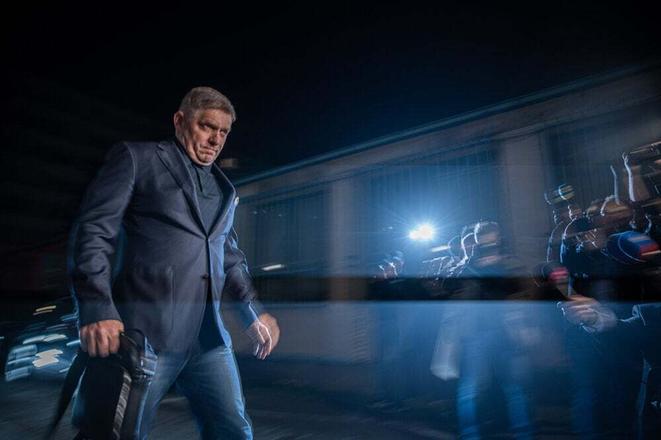Welcome to this special edition of Last Week in Slovakia, the last one of 2023. What has the year been like for Slovak journalists? And what have they learned in it?
Last Week in Slovakia will be back after the Christmas break, on January 8. Until then, follow www.spectator.sk for news from Slovakia. If you have a suggestion on how to make this overview better, let me know at michaela.terenzani@spectator.sk.
Takeaways from 2023
As we get closer to the year’s end, it’s safe to say that Slovakia’s event of the year for 2023 was the parliamentary election in late September. It is not common for a Slovak national election to attract as much attention abroad as this one did – with international media framing the vote as a potential turn away from the country’s western partners in foreign policy.
Though Vladimir Putin praised Fico (and Orbán) during his annual press conference last week, comparing them, bafflingly, to Charles de Gaulle, nearly two months into the term of Robert Fico’s fourth government, foreign policy is hardly the main concern. It has delivered on its election promise to voters about “not a bullet to Ukraine” in a fashion typical of Fico in his heyday – technically, Slovakia is not sending military aid to Ukraine from its own reserves, but Slovakia’s defence industry continues to produce and export large amounts of equipment and ammunition that will be used on the battlefield by the defenders of Ukraine.
Back home, it is a different story: Fico and his government appear determined to dramatically change the prosecution and penal system in Slovakia, apparently in order to help those people – by a curious coincidence, many of them closely tied to Fico’s Smer party – who currently face charges of corruption, organised criminality, and other serious crimes in cases overseen by the Special Prosecutor’s Office – an institution that the government now proposes to scrap altogether.
Though this is likely to happen – and the coalition plans to have MPs sit and pass laws overnight and during weekends, if needed, to achieve it – it has provoked concerted action in parliament by the opposition to hinder the process, a rising wave of public protests in streets and squares nationwide, and pointed criticism from President Zuzana Čaputová – who says she is ready to veto the laws in question – as well as the European Commission, which has hinted that it will apply the conditionality mechanism (which may include freezing some EU funds for Slovakia) if the conditions are met.
One trait that the fourth government of Robert Fico has been showing from the get-go is outright animus towards (real) journalists: two of the coalition parties, Smer and the Slovak National Party (SNS), have labelled several established media outlets as “hostile” and are refusing to talk to them. Pretend journalists are another matter: government ministers, including the new foreign minister, Juraj Blanár (Smer), are happy to sit down with representatives of “citizens’ media” – a new euphemism for the disinformation websites that the ruling parties partly have to thank for their election success.
I asked my colleagues from The Slovak Spectator and the SME daily two questions about the past year:


 Robert Fico arrives to Smer headquarters on election night. (source: Sme - Marko Erd)
Robert Fico arrives to Smer headquarters on election night. (source: Sme - Marko Erd)